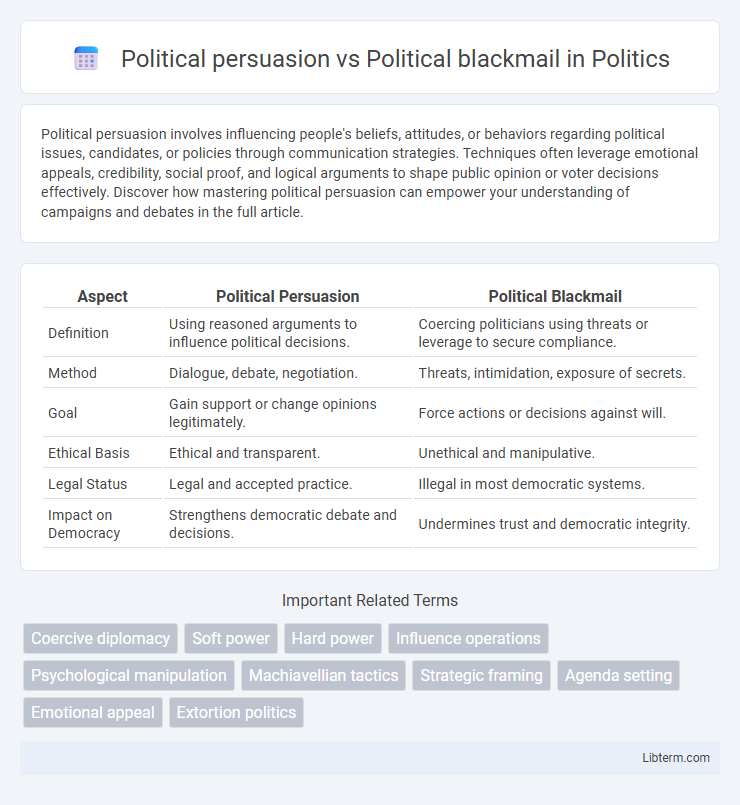Political persuasion involves influencing people's beliefs, attitudes, or behaviors regarding political issues, candidates, or policies through communication strategies. Techniques often leverage emotional appeals, credibility, social proof, and logical arguments to shape public opinion or voter decisions effectively. Discover how mastering political persuasion can empower your understanding of campaigns and debates in the full article.
Table of Comparison
| Aspect | Political Persuasion | Political Blackmail |
|---|---|---|
| Definition | Using reasoned arguments to influence political decisions. | Coercing politicians using threats or leverage to secure compliance. |
| Method | Dialogue, debate, negotiation. | Threats, intimidation, exposure of secrets. |
| Goal | Gain support or change opinions legitimately. | Force actions or decisions against will. |
| Ethical Basis | Ethical and transparent. | Unethical and manipulative. |
| Legal Status | Legal and accepted practice. | Illegal in most democratic systems. |
| Impact on Democracy | Strengthens democratic debate and decisions. | Undermines trust and democratic integrity. |
Understanding Political Persuasion
Political persuasion involves the strategic use of communication, facts, and emotional appeals to influence individuals' political beliefs and decisions through reasoned argument and credible evidence. It relies on mutual respect and transparency to foster informed consent and constructive dialogue among voters or stakeholders. Understanding political persuasion highlights the ethical distinction from political blackmail, where coercion, threats, or manipulation override genuine choice and undermine democratic processes.
Defining Political Blackmail
Political blackmail refers to the coercive practice where an individual or group uses threats, intimidation, or manipulation to force political decisions or actions, undermining democratic principles. Unlike political persuasion, which relies on reasoned argument and dialogue to influence opinions, political blackmail exploits vulnerabilities to secure compliance. This illicit tactic disrupts transparent governance and erodes public trust by prioritizing power over ethical debate.
Key Differences Between Persuasion and Blackmail
Political persuasion involves influencing others through reasoned arguments, ethical appeal, and the exchange of ideas to gain support, emphasizing transparency and voluntary acceptance. Political blackmail, in contrast, relies on coercion, threats, or manipulation to force compliance, often exploiting vulnerabilities or sensitive information to achieve objectives. The key differences lie in the methods used--persuasion employs dialogue and consent, while blackmail utilizes intimidation and duress.
Historical Examples of Political Persuasion
Historical examples of political persuasion demonstrate strategic diplomacy and influential rhetoric, such as Abraham Lincoln's Gettysburg Address shaping public opinion during the American Civil War and Franklin D. Roosevelt's Fireside Chats building trust in the U.S. government throughout the Great Depression. These instances highlight the power of ethical communication to galvanize support and foster democratic engagement without coercion. Political persuasion relies on appealing to values and reason, contrasting sharply with political blackmail, which employs threats or manipulation to enforce compliance.
Notable Cases of Political Blackmail
Notable cases of political blackmail often involve coercive tactics where individuals or groups use threats, such as releasing damaging information, to manipulate political decisions or secure power, exemplified by the Watergate scandal and the Iran-Contra affair. These incidents reveal the exploitation of compromising material to undermine opponents or force policy changes, contrasting with political persuasion that relies on argumentation and dialogue. Political blackmail undermines democratic processes by prioritizing fear and manipulation over transparent negotiation and consent.
Ethical Implications in Political Tactics
Political persuasion employs reasoned arguments and evidence to influence opinions, aligning with ethical standards by respecting autonomy and informed decision-making. Political blackmail, involving coercion or threats, breaches ethical principles by undermining free will and exploiting vulnerabilities for political gain. The ethical implications highlight a clear moral boundary, emphasizing transparency, respect, and consent as essential components of legitimate political tactics.
The Role of Media in Shaping Perceptions
Media outlets significantly influence political persuasion by framing narratives that align with specific ideologies, shaping public opinion through selective coverage and emphasis. In contrast, political blackmail relies on media exposure as a coercive tool, threatening to reveal damaging information to manipulate political actors. The interplay between media representation and political strategy highlights the power of information control in democratic processes and the vulnerability of public perception to media bias.
Psychological Impact on Political Actors
Political persuasion leverages cognitive engagement and emotional appeal, fostering voluntary attitude shifts and reinforcing leadership credibility, whereas political blackmail induces stress, fear, and coercion, often leading to compromised decision-making and psychological distress among political actors. The psychological impact of persuasion promotes resilience and commitment to political goals, contrasting with blackmail's erosion of trust and autonomy, which can result in long-term anxiety and decreased political efficacy. Understanding these divergent effects is crucial for analyzing the dynamics of power and influence within political environments.
Legal Boundaries: Persuasion vs Blackmail
Political persuasion operates within the legal framework that protects free speech and honest debate, relying on argumentation, evidence, and appeals to shared values. Political blackmail crosses legal boundaries by threatening harm, coercion, or exploiting sensitive information to force compliance or decisions, violating criminal statutes against extortion and intimidation. Courts distinguish these practices by assessing intent, means of influence, and the presence of unlawful pressure or threats in political conduct.
Safeguarding Democracy Against Manipulation
Political persuasion relies on informed argumentation and respectful dialogue to influence voters' decisions, reinforcing democratic values by promoting transparency and accountability. Political blackmail, however, undermines democracy by coercing individuals or groups through threats or intimidation, eroding trust and distorting fair decision-making processes. Safeguarding democracy against manipulation requires strong legal frameworks, vigilant civil society, and widespread public education to distinguish legitimate political engagement from coercive tactics.
Political persuasion Infographic

 libterm.com
libterm.com